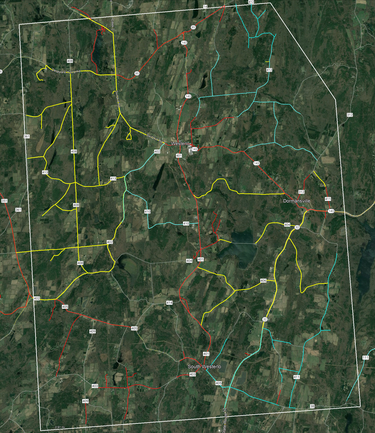Mid-Hudson will expand broadband to 301 homes in Westerlo
WESTERLO — More than a year since it was announced that the town of Westerlo would receive $1,687,500 for broadband expansion from the federal government, a company has been hired to lay the cable.
On Tuesday night, the Westerlo Town Board accepted a bid by Mid-Hudson Cable to lay down nearly 40 miles of cable that will provide broadband access to 301 homes in the town.
Supervisor Matthew Kryzak told The Enterprise that the project is expected to break ground in the summer of 2024, and that there is “a lot of red tape and formalities” to get through with the federal government before construction starts.
He also said that it’s believed the expansion will mean that every home in the town has access to broadband.
“From what we are able to determine from current broadband mapping, we will achieve 100-percent infrastructure coverage of the town,” said Kryzak, adding that the town is working to verify this by making sure its maps are up to date.
The project will make use of the entire federal grant, and any costs that go beyond that will be the responsibility of Mid-Hudson, according to the proposal.
Mid-Hudson’s competitor for the project was Midtel, which said it could cover 116 homes for the same amount of money, according to meeting minutes.
The proposal says these streets will receive cable: Albany Hill Road and its extension; county routes 1, 402, 408, and 413; Clickman Road; Delaware Turnpike; Goodfellow Road; Johnny Cake Hill Road and its extension; Kropp Road; Lombardi Road; Lorin Dee Drive; McDermott Lane; Peter Drive; Robin Ann Lane; Van Leuven Road; state routes 32, 404, and 411; Kuster Road; Swartout Road; and Boomhauer Road.
‘Modern-day fight’
The project is an enormous win for the small town, which punched above its weight to get the federal grant while other towns are attempting to solve their own broadband problems with fewer resources.
In 2021, Congressman Paul Tonko, who had requested the money from the government on behalf of the town, visited with the Westerlo Broadband Committee, which had led the effort to get the grant, and other town officials and local stakeholders to get a sense of the need for internet in the community.
Dorothy Verch, who chaired the broadband committee before leaving the area, told Tonko about a cancer patient who was home-ridden without broadband, and without access to doctors.
“There’s kids who need to do school but they can’t do it remotely [at home], which is why they need to go to the library to do homework,” she said.
Another woman who had three students at Berne-Knox-Westerlo, she said, “has a choice of paying her AT&T bill or her food bill.”
The supervisor at the time, Bill Bichteman, told Tonko that broadband availability has become an important factor in whether someone will buy a house in the area, and that lack of broadband access would likely spur a population decline that’s already in motion. Eric Hannay, president and CEO of Hannay Reels, the largest employer in town, said the same was true for his local workforce.
“I harken back to the ’30s,” Tonko said during the meeting, “when the Rural Electrification Act was brought about. President Roosevelt, when he went to Georgia for his treatments, would see outlandish lack of services, and he said that’s not America as we know it.
“So, today, the modern-day fight for utilities is broadband,” he said. “Doctors need to read X-rays … and students shouldn’t be going to a library parking lot to do their homework, and businesses need to have access to modern-day technology.”


